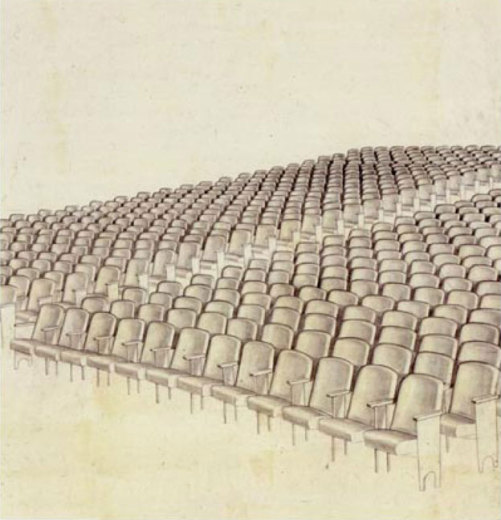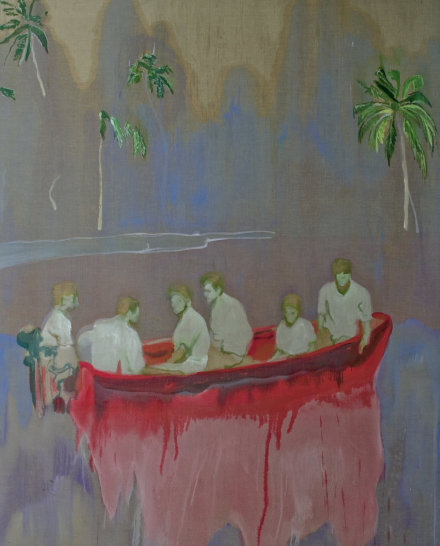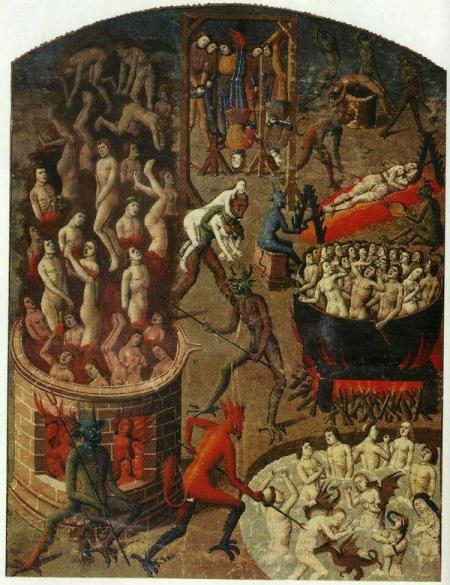
Open City, Valparaiso, Chile.
“The best place to teach architecture is in a simple box.”
Odile Decq
“The political locus of tolerance has changed: while it is more or less quietly and constitutionally withdrawn from the opposition, it is made compulsory behavior with respect to established policies.”
Herbert Marcuse
“Collegiate traditions and the preppy, Ivy League look were some of my earliest design inspirations and the starting point for our signature style.”
Tommy Hilfiger.
“As the US war machine increases the intensity of its bombing of Muslim fundamentalists and political extremists in various parts of the world, but especially in Syria and Iraq at the present moment, the official “workstations” of CNN and other news outlets engage in a kind of grotesque production of moral panics in their appeal to fear, insecurity and imminent danger. Violence is not something to be condemned but to be appropriated as a productive source for higher Nielsen ratings and more advertising revenue.”
Henry Giroux
The future is going to happen or not happen depending on pedagogy. The war machine of the United States cannot be stopped. No amount of protest or organizing can stop this train heading toward the cliffs. How many survive the inevitable crash is the crucial question. Can mankind avoid extinction.
I don’t know.
But if one is to survive after, for life to be worth living, then one must begin to think of the pedagogical models that can serve to sustain life. The current issue of Uncube magazine…here http://www.uncubemagazine.com/magazine-26-14231695.html#!/page1
is about education. Radical pedagogical solutions (focused primarily on architecture, but not exclusively). There is the Catholic University of Valparaiso’s School of Architecture and Design (Escuela de Arquitectura y Diseño de la Universidad Católica de Valparaíso), there was HfG in Ulm, Germany, Forensik Mimarlik, in Turkey, and almost a hundred years ago there was The Bauhaus.
Ethel Baraona Pohl, architect and writer, said to learn we must now unlearn. The future is about learning, not acquisition. From peer education, listening to those around you, and from teachers who also want to learn. If you teach and you do not want to learn you are a bad teacher.

Toba Khedoori
To unlearn means unlearning more than the basic commodity form, and the stuff channeled to corporate media by the U.S. government. It means unlearning cultural assumptions that are masked and marketed as something else. Thomas Frank actually wrote a pretty cogent piece back in 1995 (http://slackbastard.anarchobase.com/?p=30469) in which he pointed out that conformity was sold as a brand of non-conformity, and with a different label. It seems to me that somehow organically developing communities should actually develop around schools. That the idea of school itself should be retired. Everything should be a school. Not a village, but a school. Why else do people gather together? To share, ideas, food, clothing, sex, and art. And by art I mean anything at all creative. And that’s the problem today. In the West the hyper specialization of education has meant that nobody equates planting cauliflower with creativity, or building a small yurt. Is it art? Is cooking art? Is shoemaking? In a sense yes, but in another sense, no. But, in the context of learning, of radical pedagogy, the need to fetishize genius or make art a regressive cultural fetish would be unneeded. The problem is that if one looks at Open City, in Chile, you see they built an ampitheatre. And design students designed a great seat to place on the brick floor. Someone is always creating theatre. For theatre is everywhere all the time. There is a feeling of liberation in such places. The fact is, yes, Shakespeare and Bach and Miles and Bolano and Genet are not the same as cauliflower cultivation. But, they ARE related.

Olimpia Hotel, Tallinn, Estonia. Kallas & Kersten architects. 1980
And this is, I think, my point. If one rids oneself of the idea of seeing the world in terms of category and calculation, reduces instrumental thinking, then a village becomes a school by default. Everyone should know how to plant vegetables and cultivate them. Everyone should know basic boat building and basic carpentry. And everyone should be curious. Everyone, literally, should be students until they die. The greatest teachers should remain part time students. Lecture on St Augustine at noon, and take a seat for someone else’s lecture on the history of the Chinese junk rigged sailing or basic trigonometry in the afternoon. And then take part in communal cooking at dinnertime.
I don’t think the general public in the U.S. or Europe any longer can even imagine a world without commodities. Without shit to own. Without the turning of nature into objects to measure and probably sell. They cannot *not* imagine money, making money, hoarding money. But there is a real depth to this perceptual process. It is not just Capitalism that it hard to imagine gone, it is, for such a population, the difficulty in letting go of hierarchies, of power, of domination, and of control. The controlling of things, and people and people *as* things. This is basic; curiosity dies in exact proportion to the increase in instrumental thought. The more thinginess there is, the less questions there are.

Carlos Cruz Diez
As Frank pointed out, marketing today is always selling individuality. Or, branded individuality. The illicit is the new conformism. Titillation is in hyper drive all the time now. Politics is couched in titillation. Style style style. The province of the MTVification of news departments. I’ve heard people say, oh Badiou is (or Derrida or Marx, or Freud, or Gramsci, or Obama or Bush) not *sexy*. Sell different, but not too different. You are sold a certain kind of difference. Sexy different. This has always been true under Capitalism, to some degree anyway. You have four hundred tooth brushes to choose from, all of them almost identical. But if you thought to stain your teeth and not brush them, to walk around with stained blue teeth you would be arrested and put on medication.
The role of education, in the sense it is thought of today, began prior to World War 1 (building on Rousseau by way of Fichte and Shiller), but it was between the wars that a more heated discussion began to take shape. Herbert Read’s Education Through Art, is both an historical curiosity of a kind, but also a somewhat prescient look ahead at mass culture. Read was a singular case, a man of very wide learning and a surprising radicalism.
“…But uniqueness has no practical purpose in isolation. One of the more certain lessons of modern psychology and recent historical experiences, is that education must be a process, not only of individuation but also of integration, which is the reconciliation of individual uniqueness and social unity.”
Herbert Read
It is worth looking back at the writings of people such as F.R. Leavis (and Q.D. Leavis) and their concerns about the growing standardization of society. They saw this from that rarefied vantage point of Cambridge professors, but F.R. Leavis saw nothing good in dumbing-down education, and was hostile in general to most technology. The Cambridge creators of the Scrutiny journal feared the ‘rise of the machine’, and the educational system submitting to middle brow entertainments (this was the time of the BBC’s birth). Lurking as background to what was, in a sense anyway, a sort of nostalgia for British gentlemen’s role in running the world, was the slightly perverse concern with children. Education and *children* are of course linked. But I suspect linked in ways that mystify the actual problems.

Patrick Heron, portrait of Herbert Read.
One of the problems with leftists today is that they deny culture in the name of this materialist sobriety….what they perceive anyway as sober minded materialism. On the one hand its a corrective to mush headed romanticism, and liberal petit bourgeois relativism (meaning Capitalism). But the shadow side of this tendency is be instrumental and cynical. There is a connection between the need for titillation, and this instrumental sobriety. On the surface this seems contradictory, but in fact that cynical snark of white male America bleeds into factory Marxists in their denial of allocating a greater role to culture in social change. Aesthetic resistance does not mean valorizing only stories about the proletariat. In fact, to imagine a future of documentaries about heroic grain harvests is pretty depressing. The youthful leftist today is more concerned, however, with the titillation factor in theory. (Oh Adorno is sooooooo boring, and Badiou is such a rock star, and etc). The academic left is, with a few exceptions, pretty much not the partner to revolution, and not even a partner in social change. Talk to organizers in grass roots movements, anti death penalty, organic farming, prison reform, housing, and they will almost to a person tell you how bankrupt Academics are, and worse, how totally unhelpful are most Trotskyist movements. A friend once said to me, yes I’m a communist in a party that is labeled Stalinist. When people ask me why, he said, I tell them because its more democratic than the Trotskyist parties.

N.Y. stock exchange, 1908.
The privileged white University student, attending lectures on Ranciere or Badiou, is not part of the working class. They are not likely to ever be part of the blue collar work force. Their interests do not coincide with janitors, cab drivers or short oder cooks.
My personal experience with Academics has not been good. They can’t help but fear for their position. Their job, they professorship, in the end comes before all else. The same as home owners in the Hamptons put their property before all else. They work for the corporation. They work for the man. Where are the public intellectuals who live on the margins? They exist, but they have trouble gaining visibility. And if they do find an audience, the snarky white post grad student will recoil. Why? Because any voice from the margin is a threat. This is the shift that has occurred since the 60s. Outsiders were searched for by University students, and welcomed, in 1960, while today the most outside the University student wants to go is VICE or Salon.

Peter Doig
The academic (again with some exceptions, but I can count on one hand those exceptions) is afraid of being fired. He of she will not teach certain things in certain ways. They do not offend if they can help it. How many academics would openly praise Fidel Castro, for example? Or tell the truth about the Balkans and Milosevic? The answer is none. I don’t know any. There is this subject position that academics take; it is the false neutral. Lets hear from both sides, etc. Well, its false because one side monopolizes visible discourse today. They own media. So, no, lets not hear from both sides this time, lets hear from the side shut out 99% of the time.
I want to touch again on education, and youth. There was in the decades between WW1 and WW2 an assumption that promoted the idea of self expression for the child. That self expression went hand in hand with self fulfillment or perhaps self realization. But whatever the term this was the beginning of the educated classes condescending to discuss the poor, and the start of a very particular offshoot of narcissism. This was the handed down Romantic idea of the ethical man who has learned from literature and the arts, and which was German was well as English in national origin. As James Donald put it, this was correction through self expression. So today, public education in the U.S. the elite classes can purchase elite education, the kind geared to social networking more than anything else. And for the rest, only the most basic skills are taught, those which would allow one to work as a security guard at a mall, or at Burger King.

Hiroshi Sugimoto, photography. Portrait of Fidel Castro.

City of God, Augustine. Illuminated manuscript. 15th century.
The thrust of state mandated education was predicated on several unspoken beliefs. Firstly, that providing students with structure AND with a model of ethical and moral rectitude (the teacher) would generate a sort of osmosis, or thermal-intellectual reaction in the unconscious, or sub conscious, and thereby resulting in a more unified person, both better morally, but better as a citizen. Now the specifics were not addressed, in terms of what makes a good citizen. There is the faint odor of a Puritan cloud over this. The whole person was MORAL. Meaning repressed. Meaning obedient. Herbert Read, a sort of quasi Jungian, was one of the few thinkers of the early 20th century, who openly questioned such ideas in the context of education. In the U.S. the Kennedy presidency marked the start of re-thinking public education. Modernizing it, and also, to genuinely offer it to the poor and disadvantaged. There was a sense then, in 1960, that society was expanding and the system for shaping the young, morally, but also for purposes of control, was in need of overhaul. But it was also the last gasp of a genuine belief in school as a place to develop an ethically good and well rounded person.
There are several side-bar topics related to education today. The dominant narrative for white Americans is colored in with patriarchy crayons. (to sort of abuse metaphors myself). The paint by number program is white, male, and Imperialist. Along with this comes the rote violence of today’s United States.

Popel Coumou
The entire side industry of trophy hunting, or really almost any hunting (and we can semi exempt certain small indigenous communities, the few that are left) is an expression of the pathology of the society overall. Factory farming, hunting, both express such an acute sadism toward nature that it requires a total burial in the consciousness of the West. People simply compartmentalize, almost completely, such facts. Trophy hunting is a useless activity that is given cover in popular culture by the morbidity of western masculinity and its attendant narratives. Hunting is a symptom of a larger sickness.
Cruelty toward fellow creatures is a kind of self hatred. A deep anger that seems to be surfacing ever more frequently in irrational outbursts. Honestly, if someone sat down and collected date on internet comment threads, the conclusion would be that this is an emotionally starved society, enraged and unable to cope with daily life. There is a desperation to *win*. Winning is everything. Win or you lose. And what do you win? Doesn’t matter. Its barely a consideration. As long as one *wins*. Comment threads are internet road rage.
Notice how few questions are asked in comments threads. Comments are about owning your opinion. Not about asking questions. Questions are for weaklings.
” We need people who are not moved by the hysteria of the majority. We need people who openly admit that the majority are often, if not usually, completely wrong. This will not be easy. Westerners, of all social classes, have a strong belief that if Western domination of the Third World were to end, their already threatened lifestyles would suffer – if not entirely collapse. In effect, there is an unspoken consensus that these imperial wars are the best bet the West has for economic recovery. Not only has the Left failed to challenge this consensus, but, by its words and actions has actually become part of it. It may well be that Western culture no longer has the vitality to produce an active and worthwhile Left. This is a possibility we must consider.”
Donnchadh Mac an Ghoill

Classroom, 1900 apprx. Jacob Riis, photography.
“One inhabits a world in which long-standing notions of shared experience atrophy, and yet never one never actually attains the gratifications or rewards promised by the most recent technological options.”
Jonathan Crary
The public is subjected daily to almost unlivable and impossible demands to synchronize itself to electronic media. Bank accounts, on-line ordering, all bureaucratic activity is mediated by technology. The user is ever more helpless and powerless. There is nobody to talk to face to face. There is only submission.
Provide a phone number, an address, a shipping location, a billing location, an ID number, etc. The subject is reduced to compliance and little more. The student is being educated, increasingly, in adaptability. This is the clear message of most educational templates. Adapt.

Klavdij Sluban, photography. Youth detention center, Mojaisk, Russia 1998
The working class, or the non working poor, are continually disempowered by the ever more rapid production of meaningless innovation in gadgetry. This is the shopping model for people who can’t afford to shop. Everything is framed by disappointment. By what you cannot afford to have. The modern model for education is both broken and outmoded. It fails to provide even an iota toward a sane communal sense of life. It is geared to create anxiety, insecurity, and frustration. From grade school through high school the class divide is obvious and insidious both. At the University level, the class divide is even more pronounced, and additionally, in a hyper specialized technological universe, a research based corporatized value system is imparted and results in not curiosity and a growing imagination, but in career competition and fear and loathing of your fellow students.

Tommy Hilfiger ad. Fall 2013. (Craig McDean , photography).
The formation of open schools, the mixing of disciplines (Forensik Mimarlik in Turkey focuses on architecture but includes politics, art, and geography) is what must happen. No more diplomas, no tuition, no grades, and a system of sharing knowledge. At Forensik, projects included installing a kitchen in a bus station where stranded refugees live. But it is less the content, finally, than it is the practice of being a student. One must learn from those who know more, but everyone should submit, in a sense, to being a student. Professors must learn from others. One must always be learning something, a discipline, a craft, a philosophy. And there is another terrible burden placed on those who seek to learn past the accepted age. *Adult school* is one of those pejorative terms that stigmatizes. Why not learn math at the age of forty? Or Sanskrit or Greek or Russian or Thai or Polish at the age of fifty. Learn how to grow things. Learn farming or beekeeping. I learned beekeeping a year or so ago. An entire other world opened up. Learn how to write, how to think. There is an assumption that the young must be groomed, and cared for. There is a cut off point, a number, what is it? Twenty five? Thirty? Forty? I don’t know. I studied old Roses a few years ago. Suddenly an unknown history opened before me. Roses from the crusades, from Russia, from Bulgaria, for scent, for color, some cultivated since Roman times. Or apple trees. The tragic loss of apple varieties is an almost unknown story. The last real apple nursery in England closed a couple years ago (Scott’s Nursery in Merriot, Somerset. I had the pleasure of buying from 85 year old Frank Naish before the premature death of one of the other owners. Here is a link to the few remaining places to find heirloom apple trees http://www.fruitwise.net/links.html). History is embedded even in the names of apple varities: Hoary Morning, Frederick, Brown Snout, Sweet Alford, Broxwood Foxwhelp, King Thompkins Co., and Laxton’s Fortune to name only a few of the literally thousands one could, at one time, find. Here is a personal favorite of mine: http://www.treesofantiquity.com/index.php?main_page=product_info&products_id=102

Edward Dugmore
The citizens of the United States, more than any other country, live lives devoid of joy and wonder. Of course, not everyone, but as a sweeping generalization, it’s true. I see none of that wonder in young children. They are often too busy learning to operate their cell phone. And those who do have it, lose it soon enough. They usually lose it as soon as they go to school. I had an argument recently about the teaching of penmanship. My father had beautiful handwriting. That was another time. The debate was around the question of usefulness. One woman said no, no, teach them how to write code. I was a minority voice, though not totally alone, in arguing that learning to write well, and learning about scripts and fonts and lettering is a part of what links us to our history, and teaches something profound about how to look, and it is a basic primal activity — making signs on rocks and in the dirt, and finally on paper.

Heirloom apple varieties.
“In the Renaissance, no Fredericks or Voltaires blossomed behind the scenes; rather they never existed. Among the guild masters of the medieval city, there were no modern entrepreneurial types or trust managers who simply lacked appropriate outlets for their activity, nor among gilded journeymen, was there the unnoticed and silent consciousness, as it were, that characterized the industrial worker today…The doctrine is false that even though times change, the psychological makeup of human beings remains the same.”
Max Horkheimer
Horkheimer wrote this in the 1930s. He went on to suggest that history was not to be ignored just because people from different eras remain far murkier to us than we like to imagine. This would mean even the study of other cultures would be pointless, and clearly this is not the case. But the historical issue, that is historical research, in our own time has largely forgotten that the vast majority of the world’s population in any given time was forced through various means to renounce their instincts. The desire for equality is always driven by those under the boot heal of domination. The rulers seldom want social change. Why would they? So, when discussing the idea of education, of school, it is worth trying to see from what and where the discussion is to start.

Office, CERN, Geneva. (courtesy Lars Muller publishing).

Tim Gardner
The public looks at history, and historical figures, as if they were the same as you and I. Scratch the surface of anyone and you find the *family of man*. This is the pablum that fuels opinion makers, and it is what shapes kitsch history and biography. As Michael Parenti wrote ‘history’ is written to “enforce the existing political orthodoxy”. It is written by the privileged classes and it presents their value system. This is all sort of obvious, but what is more telling, in a sense, is that the background to historical study, as one finds it in textbooks, is that of a kitsch ‘family of man’ model. Certain rulers were *evil* because they were, well, evil. So pedagogical resistance means firstly, I think, giving up any bureaucratic institutional setting, and secondly, starting with philosophy and the arts. It may be that we’ve had enough science for the time being. This is not to suggest that science be abandoned, but only that it be freed from its corporate research based and sociological base. My fascination with CERN has to do with the fact that what is going on with the Halldron Collidor is probably closer to philosophy than it is to what conventional thinking terms science. I want more of that and less research on how to extend the shelf life of candy bars.
I want pedagogy without textbooks. I am not sure that anyone who has not recently opened a U.S. textbook knows just how horrifying these things are. I do not want children or anyone opening textbooks written in a mind numbingly bland prose, ahistorical and predicated on sociological premises, that teach generic history and social truisms divorced from all political awareness. Why is that the goal? When did this thing happen in which *not offending* anyone became the goal? When was it decided that giving offense to a few people was bad, was terminally bad? Sociology simply measures things that shouldnt be measured, or counted, or statistically analysed. It may have been a useful tool at some point, when it seemed oppositional to dogmatic state narratives, but today, textbook sociology is a brain eating protozoal infection whose generalized grammar obscures rather than reveals. Open schools must offend, must drive some off, must never be bland or generic. Better to be wrong.

Albert Renger-Patzsch, photography. Zeche Bonifacius, Essen 1948.
The presumption of self knowledge is a fascinating topic. It implies this person, this self, with abundant self awareness and willingness to comment on any question asked of him or her. It implies that backdrop to our lives from which we pluck available data when needed. This is a large topic and I will return to it in another, later, post. But, for the sake of thinking about pedagogy, it is important to realize that, for example, the Malala Yousafzai and her winning (co-winning recipient) is a fable straight out of a kitsch Conrad. Edleman PR represents Nestle, Oracle, Microsoft, and Hewlitt Packard among others. They handled the *Malala story*; which was essentially her rescue from an evil Muslim menace. Her story is getting to meet the President, and Angelina Jolie….er….Dame Angelina Jolie, and a photo op with David Beckham. This is white society rescuing third world girls. Nobody in the teary eyed audience in TV land USA stops to think, how come Malcolm X. never got one, or Huey Newton or Subcomanandante Marcos, or, even Dr. Mads Gilbert. Of course who the fuck wants this diseased blighted trophy anyway, one that sits on the mantle of several war criminals. Chavez didn’t get one, neither did Castro. Why? No, a teenager rescued and brought back to *civilization* gets one. This is marketing, a sentimental narrative of white compassion, and tolerance. The girl herself is manufactured as an image, a symbol, of moderate Islam, and a friend of the U.S. Mostly she is shown in photo ops with white men. All of it a feel good distraction because, of course, the bombing continues even as the applause dies down. This is all very obvious. And yet, it works. A resistance to such manipulation seems almost the first goal of pedagogical resistance.

Marco Maggi
Malala serves as a fitted component in this background ideology. This ideological backdrop is also an image, and a grammar. The story is inseparable from the political reality manufactured by corporate media and the government. This is the *real* against which all entertainment takes place, and all narrative. I suppose in a sense what Derrida did with the Collège international de philosophie is one version of what should happen all over. It is crucial that from kindergarten onwards the role of authority be transformed. Authority is repressive because of how it is practiced. After that the individual should be allowed to attend, or not attend, and to study what they want. If someone chooses to remain illiterate, I’m not sure that’s bad. Not many would so choose. The sociological system demands answers, it privileges answers over questions. It is an anti-philosophy. Answers are fine if ask the right questions. Heidegger, while still studying theology, suggested that the modern individual’s concern for his or her own problems ‘unfolded’ in a way that tangled them with the alienated world. Hence only ontological intellectual pursuits served personal development (of course for Heidegger this later came to mean exterminating Jews and Gypsies and anyone not German, with a Germanic ontological orientation). The constant assault of literal and allegorical clutter was turning pedagogy into intellectual housekeeping.
Peer relationships change. This is my idea of socialism. Self regulating. Class is abolished. I want universities that won’t inspire Tommy Hilfiger. I want no more Tommy Hilfigers. I want no more PR firms. But to reach that place, amid the violence of the state, police and military, much would be to change and I can’t even begin to imagine that happening. I imagine only small autonomous zones of such little importance to the Imperialist power that they are left alone. Reading Mao, reading Lenin, reading Marx. After that Freud and Adorno and Fanon and whoever you want— the point is, read those who worked to make life better. Once that’s done with, choose who you want to read, what you want to study. Start building, tending bees, and gardening. Then read Freire on pedagogy. That is about as Utopian as I can get anymore. Teaching people to *see* and *hear* is the first thing. And then to stimulate the mimetic in relation to all of it. To relearn narrative and story. That is the beginning.
“He who thinks and does not learn is in great danger.”
Confucius
As a footnote to discussions of aesthetic resistance, there is this:
http://www.theguardian.com/books/2014/oct/07/creative-writing-killing-western-literature-nobel-judge-horace-engdahl

These posts always lead me on new paths of exploration.
I was a reluctant, independent minded Ivy student but I was also fortunate to have by chance selected courses taught by some pretty remarkable profs, including a fascinating classics prof who was the only faculty member who refused to use a computer… And a great English geo prof who didn’t miss a beat when I submitted a series of poems for an assignment instead of what was asked for.
I also got to encounter this incredible language teacher with a vision for education that is sadly not in great supply::
http://youtu.be/EBxNK8cRYhA
thanks Roger. Its of course true that there are remarkable teachers out there. More of them at elite universities than at junior colleges. And its also true that there are huge numbers who fear for losing their jobs. Most are adjuncts. 70% I believe. There is less and less security for them. Plus, I suspect that soon robots with computerized power point will teach many classes. The idea of a factory system for students to be prepared for a comfortable fit with society. There is also I think an increasing sense of dysfunction. That the new corporate system of education, especially at high school level, is not working at all. And thats of course because the society is not working.
But yeah, I mean i know a number of great teachers. Great. And its inspiring to see them — but overall, and i did say I was making sweeping generalizations — Id still say overall there is a tacit fear of job loss, and on the students part a sort of eroding of curiosity. In general. This posting caused more private letters to me from people I know than any other. There were a lot of arguments…..some about the structural tensions existing for professors and adjuncts. And that’s true. But I think it tends to lift responsibility from teachers. At some point teachers need to fight back harder. There is also a horrid tyranny now of student power, because so many private universities are dependent on tuition. They have to cater to students. Its a toxic society and thats going to be reflected in schools.
A great post about which my family & I are having current discussions. There are so many things tangled-up here. My oldest daughter quit college (DePaul) after two quarters and is working part-time but wants to go back for theater/acting. Our insanely expensive schools make me ask “How to pay back loans with scarce/low-paying acting jobs?” Now she’s freaking out because it what she wants to do but knows making a living at it will be very difficult & so has to compromise because our society doesn’t value the arts, only math & science/productivity. Here’s a question in the Comments section: why are industrial arts programs being removed from schools? My youngest daughter is a freshman at Lane Tech which opened in 1908 as a trade school. Since then, they have systemically (like many other schools) removed shop classes such as woodworking, tool & die/machinist, mechanics, etc. In their place are things such as robotics & computers, aquaponics (all worthwhile endeavors). Now, I’m not a Luddite, but this trend has been occurring nation-wide where we are saying to our youth: “You don’t want to work with your hands and be in the trades. That’s for those without choices or for immigrants. You have to go to college.” That isn’t to say there aren’t any trade schools for there are. Yet what about exposing all students to these sorts of hands-on classes as I had in junior-high as well as high-school. I’m also an oddball in that I work in trades but also went to college (this creates a strange tension on the job when other tradesmen find out and say “What are you doing working here then?” Total self-devaluation…). When I was at Loyola there was a requirement to take philosophy and theology courses no matter what one’s major. The idea was to teach the humanities and create a well-rounded individual who could think. To tie these thoughts together: it seems that today’s education system is about conformity, control, & competition: “If you don’t get good grades & go to a good school you’ll be a bum”. There are only a certain number of well-paying jobs and those are being reserved for white males and surely not African-Americans; so they get a shitty education & low-paying jobs or none at all. Business & corporations need a certain sort of individual that can think just-enough to ensure profitability but not too much to be radical & realize that the current system oppresses & is corrupt. We are creating a youth dependent on the status quo who are debt-ridden & thus forced to accept crappy or immoral work just to survive. No one can start their own business because that takes money and banks aren’t lending the billions on which they sit. They are trapped and scared about their future (at least my two oldest). Their teachers are trapped. Everyone is trapped. I could say more but have already said too much… Thanks John
@Robert: Well, good questions. All you say is true. Ive talked some with Henry Giroux, who has also written a lot about student loans and the educational system. 70% of teachers are adjuncts. Part time teaching pays nothing. Literally there are teachers on food stamps. And Im not making a joke that soon classes will be taught with videos and video hook ups and recorded lessons. No live teacher at all. That is the final step given the logic at work. Attending school is now either social networking for the rich, or an education in how to be, as you say, a productive worker in fields designated as potentially useful. Except of course there are nowhere near enough jobs. Student loan is shocking. In europe….education is mostly free. Norway its free. Germany its free. But the U.S. does not think this way. Everything, and incresingly so, is about profit. And nobody ever thinks about the goals of *education* — the well rounded humane civilized individual. There is an actual clear pattern of discouraging any sort of thinking that might lead to dissent, to questioning the status quo. The schools are run by corporate think. And teachers are , as I say, very poorly paid and not seen as very important. This is true from high school through University. Exceptions exist, but they are rare. Its a nation of guest workers, part time, non unionized, and fungible. Period. Something has to give though….because its falling apart.
terrific…
by the way Michael Parenti is getting a well deserved award
On October 26, Michael Parenti will be given a Lifetime Achievement Award.
San Francisco, California
Before Columbus Foundation
25th Annual American Book Awards
Justin Desmangles, Chair 916 425-7916
SF Jazz Center
201 Franklin Street (at Fell)
Sunday, October 26, 2014, 2-5 pm
Lifetime Achievement Award for Michael Parenti (open to the public)
In addition, individual book awards to other authors
Shopping for ideas; this is so true, and on the web these ideas really are standing in for clothes, for markers of tribe. And increasingly I see young people consciously indifferent to whether their ideas are valid — they really do resent the suggestion they should learn and verify, that there is a reality to which the symbols and topoi they toy with refer — and concern only with how they look in them and how they work to network and link them.
And I think this really is a disabling of language capacity – language as we alter kackers understand it; it really is a deck of cards or images for the under thirties, which they arrange in sequences that signify but the synthesizing power, the very capacity of sentence making, the relations of words to one another and to context of totality, is really eroding. I don’t mean this as a joke or hyperbole – there is an inability to language (as verb) the world, like a mental disorder. It’s especially clear with these students who have engaged with a little Derrida or who function in milieux where that laborious estrangement of words was routine.
I watched the wonderful old pbs film of Rhinoceros the other night, with Zero Mostel and Gene Wilder. Very relevant now. I was trying to write down afterwards all the thoughts it had prompted as I watched and all the ways in which it crossed my mind to explore why this is no longer possible, and I found it had sort of shifted my head back into a narrative, synthetic, dialectical motion of thought very unlike how I feel myself thinking after reading twitter and five open tabs of webcontent simultaneously while listening to some lecture on youtube. It was not only that I was concentrating on only one thing; there was a pace. But also the opening of that space that the architecture of the language and thought creates that you were describing before/. I could feel that space — a social space — opening in my mind again, as if it had been cramped shut. A pretty didactic play, too, accomplished this.
John you really should write a book in the vein of Herbert Blau’s book, a long essay on theatre and everything else.
‘
I would even know how it should be organized. Like each chapter jumps off from an engagement with another writer, so as not to “throw stones in the dark”. But you would alternate between writers you revere and writers you loathe.
@molly:
Yeah, Ive been thinking of a book. And yes to all those remarks. The indifference to the validity of ideas is what amazes me. I feel often that people are reading from a script. A script that has been assembled over long hours of shopping.
I intend to get into a lot of this next posting,. But I m glad you mention the Ionesco…..and that sense of space. That seems sooooooooooooooo crucial to me. And its been lost. I can almost tell right away when people discuss art and theatre…or even film, if they sort of ‘get that’ or not. Its the litmus test for mimesis in a sense.
I think the main issue with the left today is they want to separate the aesthetic from the sociopolitical. It’s a huge problem, but I don’t think it’s a particularly new one. The Cahiers critics dealt with this in the fifties, as well, the French bourgeois left embracing en masse the “tradition of quality” films praised at Cannes but attacked by the auteurists. Certainly one finds a lot of this leftist snark in the film criticism of a publication like the Village Voice. J. Hoberman was certainly a culprit. Sure, Hoberman claims to like Godard and Akerman and what not, but just see how he discusses Antonioni, approvingly but in a manner that’s patronizing. Harold Bloom seems the opposite extreme, de-politicized aesthetic appreciation. There’s this sense today that if you value art, you’re a naive Romantic or worse a dandy.
I was thinking the space that the language of theatre opens as you say does have to do with referentiality and this relation to history that people bring in, so its not solipsist hyperreality loop like cinema…the long term effects of the screens eliminating this relation become more and more obvious now.
here’s an old post, we used to discuss this stuff on the blogs, I was remembering….
http://web.archive.org/web/20061029222901/http://lecolonelchabert.blogspot.com/2006/05/this-is-not-post.html
For me, virtually the only signs of an intellectual grasp of reality these days lies in some internet expressions. Experiencing thirty-five years of college teaching, I witnessed the pervasive replacement of the human mind by machines, managers and
machine mentality, a deadly form of pervasive privatization. Thus, the great excuse for
human enslavement via “strong leaders” in America today flies under the banner of
Strauss, Rand and political company, all those who are both brain dead and soul dead. Lewis Powell’s 1973 “memo” which laid out a domestic invasion of democracy
by “endangered” business has had a completion now far more successful than the defeat of democracy than Hitler. Consciousness has been put to sleep and a new Perverseness covers the land; it is so effective, many people refuse to believe their
own senses. Since I write verse to stay sane, I will close with a recent response to
reflect a verse rendering.
PRAYER, AFTER YEATS
I pray for all who grow old
I pray for all out in the cold
I pray for those who labor is sold
I pray truth may someday be told
I pray good to evil does not fold
I pray to freedom and goodness we hold
I pray we do not to Fascism fold
I pray our orb in its balance will always roll
A simple prayer that defies reality
Which steadily chews life in its totality
II
Where went Yeats’ fragile world of care
Custom and beauty all could share
No slouching now of the Beast
Bethlehem has fallen out of reach
The Beast moves upright
In its wake, only blight
Horsemen of the Apocalypse ride in the East
To vulture after devastation of the Beast
Our smooth, assured technology
Becomes a deadly pathology
Our enslaving blindness has exploded
As pent up repression and Chaos unloaded
No more breaking news
It’s time for all to pay their dues
III
The evil, who knew not where they tread
On the ancient road to greed, leaving only the dead
Conquests, kings, generals, Stalin, globalists, all fiends
All resurrect and embody the Beast again and again
Everything now a war and a race
Thinking Man has conquered Time and Space
Amid all this haste
Know this: the Beast lays All to waste
Is never under Necessity or in haste
Machine Man thinks he knows the future
Can not see his demise as another suture
As unraveling Fate plays out
Without any doubt
Seductive dreams of madness
End in destruction of human happiness
IV
A mere Clod,
Trying to be God
Emitting lies and guile
The World is now full of empty things
Few recognize what the future brings
Beast! Oh, Beast!
Here is your final Feast
——C. Daughaday/8/10/14
Your thoughts and writings are very uplifting; thank you.